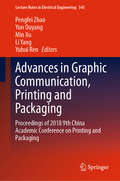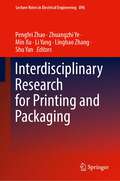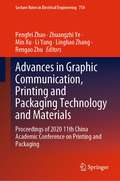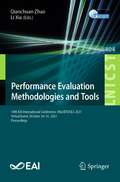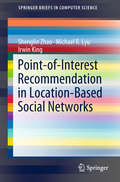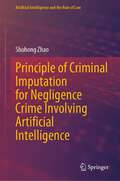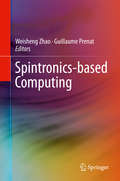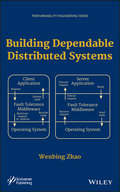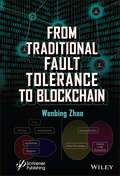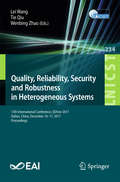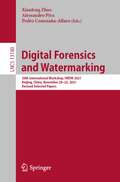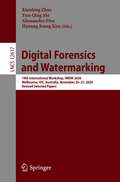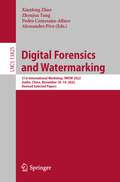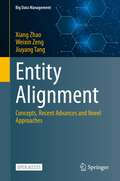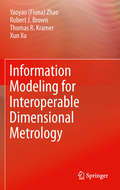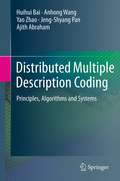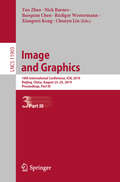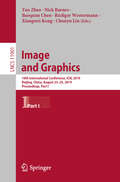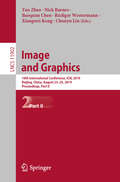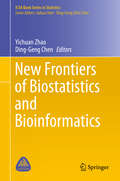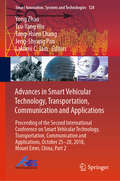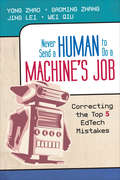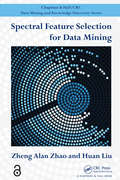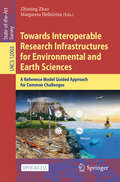- Table View
- List View
Advances in Graphic Communication, Printing and Packaging: Proceedings of 2018 9th China Academic Conference on Printing and Packaging (Lecture Notes in Electrical Engineering #543)
by Pengfei Zhao Yun Ouyang Min Xu Li Yang Yuhui RenThis book includes a selection of reviewed papers presented at the 9th China Academic Conference on Printing and Packaging, which was held in November 2018 in Shandong, China. The conference was jointly organized by the China Academy of Printing Technology and Qilu University of Technology (Shandong Academy of Sciences). With 8 keynote talks and over 200 presented papers on graphic communication and packaging technologies, the conference attracted more than 300 scientists.The proceedings cover the recent findings in color science and technology, image processing technology, digital media technology, mechanical engineering and numerical control, materials and detection, digital process management technology in printing and packaging, and other technologies. As such, the book is of interest to university researchers, R&D engineers and graduate students in the field of graphic arts, packaging, color science, image science, material science, computer science, digital media, and network technology.
Interdisciplinary Research for Printing and Packaging (Lecture Notes in Electrical Engineering #896)
by Pengfei Zhao Zhuangzhi Ye Min Xu Li Yang Linghao Zhang Shu YanThis book includes original, peer-reviewed research papers from the 12th China Academic Conference on Printing and Packaging (CACPP 2021), held in Beijing, China on November 12-14, 2021. The proceedings cover the recent findings in color science and technology, image processing technology, digital media technology, mechanical and electronic engineering and numerical control, materials and detection, digital process management technology in printing and packaging, and other technologies. As such, the book is of interest to university researchers, R&D engineers and graduate students in the field of graphic arts, packaging, color science, image science, material science, computer science, digital media, network technology, and smart manufacturing technology.
Advances in Graphic Communication, Printing and Packaging Technology and Materials: Proceedings of 2020 11th China Academic Conference on Printing and Packaging (Lecture Notes in Electrical Engineering #754)
by Pengfei Zhao Zhuangzhi Ye Min Xu Li Yang Linghao Zhang Rengao ZhuThis book includes a selection of reviewed papers presented at the 11th China Academic Conference on Printing and Packaging, held on November 26–29, 2020, Guangzhou, China. The conference is jointly organized by China Academy of Printing Technology and South China University of Technology. With 10 keynote talks and 200 presented papers on graphic communication and packaging technologies, the conference attracted more than 300 scientists.The proceedings cover the recent findings in color science and technology, image processing technology, digital media technology, mechanical and electronic engineering and numerical control, materials and detection, digital process management technology in printing and packaging, and other technologies. As such, the book is of interest to university researchers, R&D engineers and graduate students in the field of graphic arts, packaging, color science, image science, material science, computer science, digital media, network technology and smart manufacturing technology.
Performance Evaluation Methodologies and Tools: 14th EAI International Conference, VALUETOOLS 2021, Virtual Event, October 30–31, 2021, Proceedings (Lecture Notes of the Institute for Computer Sciences, Social Informatics and Telecommunications Engineering #404)
by Qianchuan Zhao Li XiaThis book constitutes the refereed conference proceedings of the 14th International Conference on Performance Evaluation Methodologies and Tools, VALUETOOLS 2021, held in October 2021. Due to the safety concerns and travel restrictions caused by COVID-19, VALUETOOLS took place online in a live stream. VALUETOOLS 2021 aims to provide a world-leading and multidisciplinary venue for researchers and practitioners in diverse disciplines such as computer science, networks and telecommunications, operations research, optimization, control theory and manufacturing. The 16 full papers were carefully reviewed and selected from 32 submissions and focus on methodologies and practices in modelling, performance evaluation and optimization of complex systems.
Point-of-Interest Recommendation in Location-Based Social Networks (SpringerBriefs in Computer Science)
by Shenglin Zhao Michael R. Lyu Irwin KingThis book systematically introduces Point-of-interest (POI) recommendations in Location-based Social Networks (LBSNs). Starting with a review of the advances in this area, the book then analyzes user mobility in LBSNs from geographical and temporal perspectives. Further, it demonstrates how to build a state-of-the-art POI recommendation system by incorporating the user behavior analysis. Lastly, the book discusses future research directions in this area. This book is intended for professionals involved in POI recommendation and graduate students working on problems related to location-based services. It is assumed that readers have a basic knowledge of mathematics, as well as some background in recommendation systems.
Principle of Criminal Imputation for Negligence Crime Involving Artificial Intelligence (Artificial Intelligence and the Rule of Law)
by Shuhong ZhaoThis book provides an in-depth discussion of the theoretical and practical issues of criminal imputation for negligence crime involving artificial intelligence. Accordingly, this study combines the imputation challenges brought about by AI with traditional criminal imputation theory and analyses imputation for negligence crime involving AI from three aspects: the basic principles, structure, and results of imputation for negligence crime involving AI. The traditional theory of imputation is discussed in detail. The readership is a group of people interested in this topic, including, in particular, interested laymen, undergraduate students and postgraduate researchers. The highlights of this book are it identifies the imputation challenges bought about by AI, reveals the theoretical and practical gap in the criminal imputation of negligent crimes involving AI, and provides an in-depth and creative ideas of criminal imputation for the negligent crimes involving AI.
Spintronics-based Computing
by Weisheng Zhao Guillaume PrenatThis book provides a comprehensive introduction to spintronics-based computing for the next generation of ultra-low power/highly reliable logic. It will cover aspects from device to system-level, including magnetic memory cells, device modeling, hybrid circuit structure, design methodology, CAD tools, and technological integration methods. This book is accessible to a variety of readers and little or no background in magnetism and spin electronics are required to understand its content. The multidisciplinary team of expert authors from circuits, devices, computer architecture, CAD and system design reveal to readers the potential of spintronics nanodevices to reduce power consumption, improve reliability and enable new functionality.
Building Dependable Distributed Systems
by Wenbing ZhaoThis book covers the most essential techniques for designing and building dependable distributed systems. Instead of covering a broad range of research works for each dependability strategy, the book focuses only a selected few (usually the most seminal works, the most practical approaches, or the first publication of each approach) are included and explained in depth, usually with a comprehensive set of examples. The goal is to dissect each technique thoroughly so that readers who are not familiar with dependable distributed computing can actually grasp the technique after studying the book.The book contains eight chapters. The first chapter introduces the basic concepts and terminologies of dependable distributed computing, and also provide an overview of the primary means for achieving dependability. The second chapter describes in detail the checkpointing and logging mechanisms, which are the most commonly used means to achieve limited degree of fault tolerance. Such mechanisms also serve as the foundation for more sophisticated dependability solutions. Chapter three covers the works on recovery-oriented computing, which focus on the practical techniques that reduce the fault detection and recovery times for Internet-based applications. Chapter four outlines the replication techniques for data and service fault tolerance. This chapter also pays particular attention to optimistic replication and the CAP theorem. Chapter five explains a few seminal works on group communication systems. Chapter six introduces the distributed consensus problem and covers a number of Paxos family algorithms in depth. Chapter seven introduces the Byzantine generals problem and its latest solutions, including the seminal Practical Byzantine Fault Tolerance (PBFT) algorithm and a number of its derivatives. The final chapter covers the latest research results on application-aware Byzantine fault tolerance, which is an important step forward towards practical use of Byzantine fault tolerance techniques.
From Traditional Fault Tolerance to Blockchain
by Wenbing ZhaoThis book covers the most essential techniques for designing and building dependable distributed systems, from traditional fault tolerance to the blockchain technology. Topics include checkpointing and logging, recovery-orientated computing, replication, distributed consensus, Byzantine fault tolerance, as well as blockchain. This book intentionally includes traditional fault tolerance techniques so that readers can appreciate better the huge benefits brought by the blockchain technology and why it has been touted as a disruptive technology, some even regard it at the same level of the Internet. This book also expresses a grave concern on using traditional consensus algorithms in blockchain because with the limited scalability of such algorithms, the primary benefits of using blockchain in the first place, such as decentralization and immutability, could be easily lost under cyberattacks.
Quality, Reliability, Security and Robustness in Heterogeneous Systems: 13th International Conference, Qshine 2017, Dalian, China, December 16-17, 2017, Proceedings (Lecture Notes of the Institute for Computer Sciences, Social Informatics and Telecommunications Engineering #234)
by Wenbing Zhao Tie Qiu Lei WangThis book constitutes the refereed post-conference proceedings of the 13th International Conference on Quality, Reliability, Security and Robustness in Heterogeneous Networks, QShine 2017, held in Dalian, China, in December 2017. The 25 revised full papers were carefully reviewed and selected from 43 submissions. The papers are organized thematically in tracks, starting with mobile and wireless networks, quality and reliability, wireless networking algorithms and protocols, and smart applications.
Digital Forensics and Watermarking: 20th International Workshop, IWDW 2021, Beijing, China, November 20–22, 2021, Revised Selected Papers (Lecture Notes in Computer Science #13180)
by Xianfeng Zhao Alessandro Piva Pedro Comesaña-AlfaroThis volume constitutes the proceedings of the 20th International Workshop on Digital Forensics and Watermarking, IWDW 2021, held in Beijing, China, in November 2021. The 18 full papers in this volume were carefully reviewed and selected from 32 submissions. The are categorized in the following topical headings: Forensics and Security Analysis; Watermarking and Steganology.
Digital Forensics and Watermarking: 19th International Workshop, IWDW 2020, Melbourne, VIC, Australia, November 25–27, 2020, Revised Selected Papers (Lecture Notes in Computer Science #12617)
by Xianfeng Zhao Yun-Qing Shi Alessandro Piva Hyoung Joong KimThis volume constitutes the proceedings of the 19th International Workshop on Digital Forensics and Watermarking, IWDW 2020, held in Melbourne, VIC, Australia, in November 2020.The 20 full papers in this volume were carefully reviewed and selected from 43 submissions. They cover topics such as: novel research, development and application of digital watermarking and forensics techniques for multimedia security.
Digital Forensics and Watermarking: 21st International Workshop, IWDW 2022, Guilin, China, November 18-19, 2022, Revised Selected Papers (Lecture Notes in Computer Science #13825)
by Xianfeng Zhao Zhenjun Tang Pedro Comesaña-Alfaro Alessandro PivaThis book constitutes the refereed proceedings of the 21st International Workshop, IWDW 2022, held in Guilin, China, during November 18-19, 2022. The 14 full papers included in this book were carefully reviewed and selected from 30 submissions. They were organized in topical sections as follows: Steganology, Forensics and Security Analysis, Watermarking.
Entity Alignment: Concepts, Recent Advances and Novel Approaches (Big Data Management)
by Xiang Zhao Weixin Zeng Jiuyang TangThis open access book systematically investigates the topic of entity alignment, which aims to detect equivalent entities that are located in different knowledge graphs. Entity alignment represents an essential step in enhancing the quality of knowledge graphs, and hence is of significance to downstream applications, e.g., question answering and recommender systems. Recent years have witnessed a rapid increase in the number of entity alignment frameworks, while the relationships among them remain unclear. This book aims to fill that gap by elaborating the concept and categorization of entity alignment, reviewing recent advances in entity alignment approaches, and introducing novel scenarios and corresponding solutions.Specifically, the book includes comprehensive evaluations and detailed analyses of state-of-the-art entity alignment approaches and strives to provide a clear picture of the strengths and weaknesses of the currently available solutions, so as to inspire follow-up research. In addition, it identifies novel entity alignment scenarios and explores the issues of large-scale data, long-tail knowledge, scarce supervision signals, lack of labelled data, and multimodal knowledge, offering potential directions for future research. The book offers a valuable reference guide for junior researchers, covering the latest advances in entity alignment, and a valuable asset for senior researchers, sharing novel entity alignment scenarios and their solutions. Accordingly, it will appeal to a broad audience in the fields of knowledge bases, database management, artificial intelligence and big data.
Information Modeling for Interoperable Dimensional Metrology
by Y Zhao Robert Brown T Kramer Xun XuDimensional metrology is an essential part of modern manufacturing technologies, but the basic theories and measurement methods are no longer sufficient for today's digitized systems. The information exchange between the software components of a dimensional metrology system not only costs a great deal of money, but also causes the entire system to lose data integrity. Information Modeling for Interoperable Dimensional Metrology analyzes interoperability issues in dimensional metrology systems and describes information modeling techniques. It discusses new approaches and data models for solving interoperability problems, as well as introducing process activities, existing and emerging data models, and the key technologies of dimensional metrology systems. Written for researchers in industry and academia, as well as advanced undergraduate and postgraduate students, this book gives both an overview and an in-depth understanding of complete dimensional metrology systems. By covering in detail the theory and main content, techniques, and methods used in dimensional metrology systems, Information Modeling for Interoperable Dimensional Metrology enables readers to solve real-world dimensional measurement problems in modern dimensional metrology practices.
Distributed Multiple Description Coding
by Yao Zhao Huihui Bai Jeng-Shyang Pan Ajith Abraham Anhong WangThis book examines distributed video coding (DVC) and multiple description coding (MDC), two novel techniques designed to address the problems of conventional image and video compression coding. Covering all fundamental concepts and core technologies, the chapters can also be read as independent and self-sufficient, describing each methodology in sufficient detail to enable readers to repeat the corresponding experiments easily. Topics and features: provides a broad overview of DVC and MDC, from the basic principles to the latest research; covers sub-sampling based MDC, quantization based MDC, transform based MDC, and FEC based MDC; discusses Sleplian-Wolf coding based on Turbo and LDPC respectively, and comparing relative performance; includes original algorithms of MDC and DVC; presents the basic frameworks and experimental results, to help readers improve the efficiency of MDC and DVC; introduces the classical DVC system for mobile communications, providing the developmental environment in detail.
Image and Graphics: 10th International Conference, ICIG 2019, Beijing, China, August 23–25, 2019, Proceedings, Part III (Lecture Notes in Computer Science #11903)
by Yao Zhao Nick Barnes Baoquan Chen Rüdiger Westermann Xiangwei Kong Chunyu LinThis three-volume set LNCS 11901, 11902, and 11903 constitutes the refereed conference proceedings of the 10thth International Conference on Image and Graphics, ICIG 2019, held in Beijing, China, in August 2019. The 183 full papers presented were selected from 384 submissions and focus on advances of theory, techniques and algorithms as well as innovative technologies of image, video and graphics processing and fostering innovation, entrepreneurship, and networking.
Image and Graphics: 10th International Conference, ICIG 2019, Beijing, China, August 23–25, 2019, Proceedings, Part I (Lecture Notes in Computer Science #11901)
by Yao Zhao Nick Barnes Baoquan Chen Rüdiger Westermann Xiangwei Kong Chunyu LinThis three-volume set LNCS 11901, 11902, and 11903 constitutes the refereed conference proceedings of the 10thth International Conference on Image and Graphics, ICIG 2019, held in Beijing, China, in August 2019. The 183 full papers presented were selected from 384 submissions and focus on advances of theory, techniques and algorithms as well as innovative technologies of image, video and graphics processing and fostering innovation, entrepreneurship, and networking.
Image and Graphics: 10th International Conference, ICIG 2019, Beijing, China, August 23–25, 2019, Proceedings, Part II (Lecture Notes in Computer Science #11902)
by Yao Zhao Xiangwei Kong Nick Barnes Baoquan Chen Rüdiger Westermann Chunyu LinThis three-volume set LNCS 11901, 11902, and 11903 constitutes the refereed conference proceedings of the 10thth International Conference on Image and Graphics, ICIG 2019, held in Beijing, China, in August 2019. The 183 full papers presented were selected from 384 submissions and focus on advances of theory, techniques and algorithms as well as innovative technologies of image, video and graphics processing and fostering innovation, entrepreneurship, and networking.
New Frontiers of Biostatistics and Bioinformatics (ICSA Book Series in Statistics)
by Yichuan Zhao Ding-Geng ChenThis book is comprised of presentations delivered at the 5th Workshop on Biostatistics and Bioinformatics held in Atlanta on May 5-7, 2017. Featuring twenty-two selected papers from the workshop, this book showcases the most current advances in the field, presenting new methods, theories, and case applications at the frontiers of biostatistics, bioinformatics, and interdisciplinary areas.Biostatistics and bioinformatics have been playing a key role in statistics and other scientific research fields in recent years. The goal of the 5th Workshop on Biostatistics and Bioinformatics was to stimulate research, foster interaction among researchers in field, and offer opportunities for learning and facilitating research collaborations in the era of big data. The resulting volume offers timely insights for researchers, students, and industry practitioners.
Advances in Smart Vehicular Technology, Transportation, Communication and Applications: Proceeding of the Second International Conference on Smart Vehicular Technology, Transportation, Communication and Applications, October 25-28, 2018 Mount Emei, China, Part 2 (Smart Innovation, Systems and Technologies #128)
by Yong Zhao Tsu-Yang Wu Tang-Hsien Chang Jeng-Shyang Pan Lakhmi C. JainThis book highlights papers presented at the Second International Conference on Smart Vehicular Technology, Transportation, Communication and Applications (VTCA 2018), which was held at Mount Emei, Sichuan Province, China from 25 to 28 October 2018. The conference was co-sponsored by Springer, Southwest Jiaotong University, Fujian University of Technology, Chang’an University, Shandong University of Science and Technology, Fujian Provincial Key Lab of Big Data Mining and Applications, and the National Demonstration Center for Experimental Electronic Information and Electrical Technology Education (Fujian University of Technology). The conference was intended as an international forum for researchers and professionals engaged in all areas of smart vehicular technology, vehicular transportation, vehicular communication, and applications.
Never Send a Human to Do a Machine's Job: Correcting the Top 5 EdTech Mistakes
by Yong Zhao Dr Gaoming Zhang Jing Lei Wei QiuDo what you do best and let technology do the rest Technology has transformed lives. Why then, has it not transformed education? What needs to change to ensure integration that empowers students and enhances teacher depth? Learn how to let technology cultivate student autonomy, creativity, and responsibility while focusing on lessons that hone higher-order and critical thinking skills. See technology as a complement rather than a replacement Embrace its creation potential over consumption Encourage personalized learning, autonomy, and creativity over outcomes Celebrate digital competence over curriculum improvement Focus on tech-pedagogy over product usage
Never Send a Human to Do a Machine's Job: Correcting the Top 5 EdTech Mistakes
by Yong Zhao Dr Gaoming Zhang Jing Lei Wei QiuDo what you do best and let technology do the rest Technology has transformed lives. Why then, has it not transformed education? What needs to change to ensure integration that empowers students and enhances teacher depth? Learn how to let technology cultivate student autonomy, creativity, and responsibility while focusing on lessons that hone higher-order and critical thinking skills. See technology as a complement rather than a replacement Embrace its creation potential over consumption Encourage personalized learning, autonomy, and creativity over outcomes Celebrate digital competence over curriculum improvement Focus on tech-pedagogy over product usage
Spectral Feature Selection for Data Mining (Chapman And Hall/crc Data Mining And Knowledge Discovery Ser.)
by Zheng Alan Zhao Huan LiuSpectral Feature Selection for Data Mining introduces a novel feature selection technique that establishes a general platform for studying existing feature selection algorithms and developing new algorithms for emerging problems in real-world applications. This technique represents a unified framework for supervised, unsupervised, and semisupervise
Towards Interoperable Research Infrastructures for Environmental and Earth Sciences: A Reference Model Guided Approach for Common Challenges (Lecture Notes in Computer Science #12003)
by Zhiming Zhao Margareta HellströmThis open access book summarises the latest developments on data management in the EU H2020 ENVRIplus project, which brought together more than 20 environmental and Earth science research infrastructures into a single community. It provides readers with a systematic overview of the common challenges faced by research infrastructures and how a ‘reference model guided’ engineering approach can be used to achieve greater interoperability among such infrastructures in the environmental and earth sciences. The 20 contributions in this book are structured in 5 parts on the design, development, deployment, operation and use of research infrastructures. Part one provides an overview of the state of the art of research infrastructure and relevant e-Infrastructure technologies, part two discusses the reference model guided engineering approach, the third part presents the software and tools developed for common data management challenges, the fourth part demonstrates the software via several use cases, and the last part discusses the sustainability and future directions.
